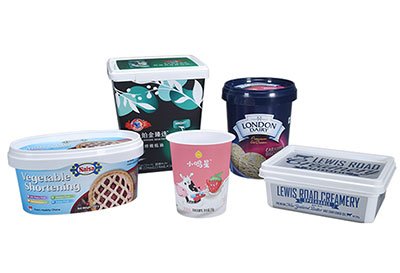+86 137 0938 2367
+86 137 0938 2367
Jun. 17, 2023
In-Mold Labeling (IML) has gained immense popularity in the packaging industry due to its seamless integration of labels and containers, resulting in visually appealing and durable packaging solutions. However, some IML containers, particularly those used for dairy products like round ice cream tubs, yogurt tubs, and margarine packaging, have encountered a recurring issue of easy cracking at the seams. This article aims to explore the causes behind this problem and present effective solutions to overcome it.

IML containers are known for their high-quality aesthetics and durability. However, the stress concentration at the seam area during the injection molding process can lead to cracking issues. This problem can be attributed to various factors, including the choice of materials, design flaws, production processes, and transportation conditions.
Material Selection: Choosing the right materials is crucial for ensuring the structural integrity of IML containers. Opt for high-quality, food-grade plastics with excellent impact resistance and flexibility. Conduct thorough testing to determine the material's ability to withstand stress and prevent cracking at the seams.
Design Optimization: Collaborate closely with packaging designers and manufacturers to optimize the design of IML containers. Focus on reducing stress concentration points by incorporating rounded corners and smoother transitions. Reinforce critical areas prone to cracking, such as the seams, with additional support structures or ribbing.
Process Control: Implement stringent quality control measures throughout the production process to minimize the chances of cracking. Monitor key variables such as temperature, pressure, and cooling rates to ensure optimal molding conditions. Regularly inspect molds to identify any signs of wear and tear that could contribute to the problem.
Transportation and Storage: Consider the impact of transportation and storage conditions on the integrity of IML containers. Fragile dairy products are often subjected to rough handling and temperature fluctuations during distribution. Utilize packaging solutions that offer adequate protection against mechanical stress and thermal shocks, such as shock-absorbing materials and thermal insulation.
Product Testing: Thoroughly test the IML containers under realistic conditions to assess their resistance to cracking. Simulate various transportation scenarios, including vibration, stacking, and temperature variations. Conduct drop tests and compression tests to evaluate the containers' durability and ability to withstand external forces.
The problem of easy cracking at the seams of IML containers used in dairy food packaging, such as round ice cream tubs, yogurt tubs, and margarine packaging, can be effectively addressed through a combination of material selection, design optimization, process control, proper transportation, and thorough testing. By implementing these solutions, manufacturers can enhance the structural integrity of IML containers, ensuring the safe and secure packaging of dairy products while maintaining their visual appeal and durability. With continued advancements in material science and packaging technologies, the industry can overcome these challenges and deliver reliable IML solutions that meet the highest quality standards.
HONOKAGE has extensive design and production experience in this field. We welcome your inquiries regarding your IML packaging project.
Navigation
+86 596 6797 686
+86 137 0938 2367
Longchi Development Zone, Jiaomei Town, Taiwanese Investment Zone, Zhangzhou, Fujian, China
